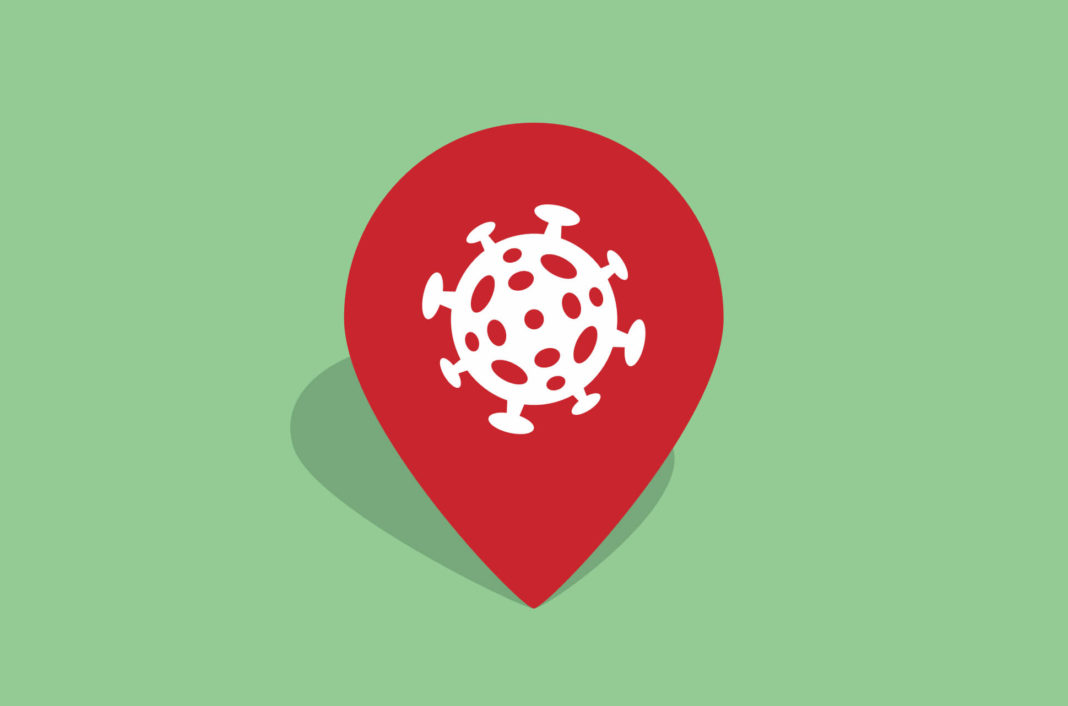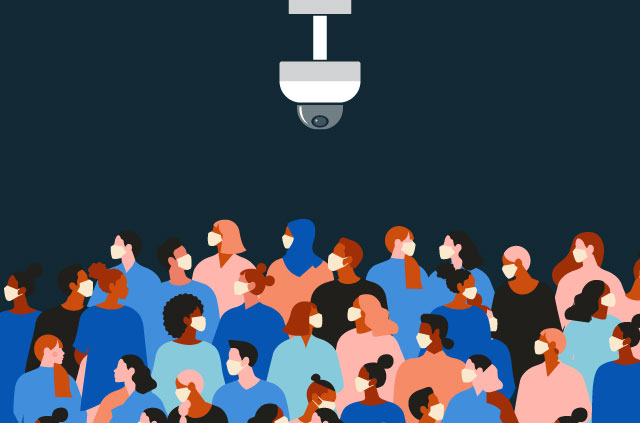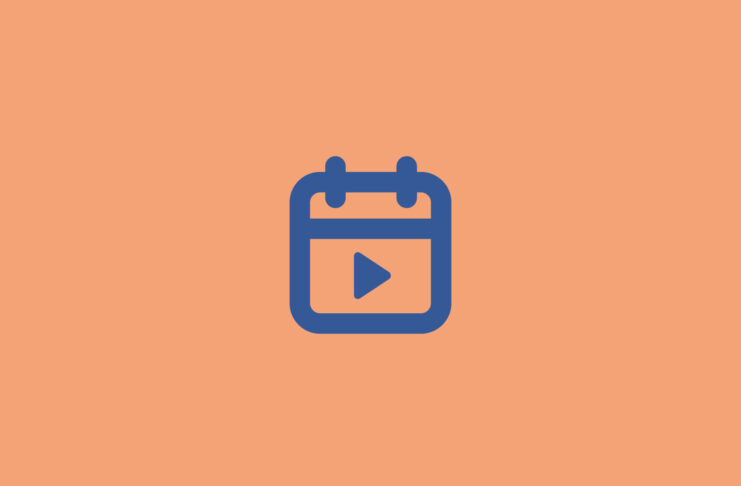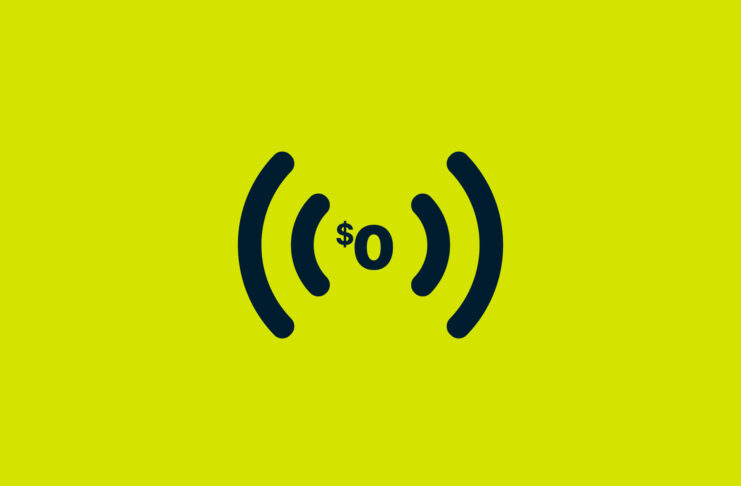This post was originally published on May 21, 2020.
Big tech got a thumbs down in ExpressVPN’s last survey about American attitudes towards privacy, and while things have changed slightly since the emergence of Covid-19, the overall attitude remains one of mistrust.
A new survey of 1,200 American adults commissioned by ExpressVPN found that 75% of people believe that contact-tracing apps violate a person’s privacy, and 77% are convinced they are at risk of mass surveillance long term as a result of the increase in the prevalence of contact-tracing mobile applications.
But Americans realize that these are unprecedented times and require complex, out-of-the-box solutions. Despite the potential loss of privacy via contact-tracing apps, 59% of survey respondents indicated a willingness to forgo some of their rights for the sake of public health.
What is contact-tracing and what do Americans think about it?
Contact-tracing is the process of identifying and monitoring people who might have been exposed to Covid-19, usually after confirmed contact with a diagnosed individual. The process works backward, meaning it’s only put into effect after a positive test. Public health officials then scramble to uncover who that person might have visited or been in contact with in a public setting.
All those identified are asked to self-isolate for 14 days and monitor themselves for symptoms.
Contact-tracing apps have dominated global headlines as they provide a low-cost, tech-enabled solution to a problem that would otherwise involve lots of manual effort. After all, there are over 3 billion smartphones to help; it’s a question of using GPS and Bluetooth data to triangulate location history.
Such apps are being used in several parts of the world, including Singapore, South Korea, Iceland, and Israel. Australia and the UK are in the process of creating localized versions for their residents. The pandemic has also united mortal enemies Apple and Google as they jointly try to come up with a contact-tracing tool.
But contact-tracing hasn’t been without its fair share of critics, especially when you consider that Bluetooth tracking is far more accurate and, hence, invasive than GPS. Others have added that contact-tracing widens the digital divide and can be subject to data manipulation.
Despite big tech’s fervent efforts and PR spins, many public health officials in the U.S. have rejected the mass rollout of contact-tracing apps in areas under their jurisdiction.
States like New York, California, and Massachusetts have preferred to take an old-school, analog solution to the problem. They’re hiring tens of thousands of people to act as manual contact tracers. Doctors and public health officials across the country are urging the federal government to get on board, too, arguing that manual contact tracing has been practiced and honed over decades, and the current situation is far too sensitive for an untested tech-based approach.
While 54% of surveyed American adults expressed willingness to voluntarily download a contact-tracing app, concerns about potential data misuse still run high. Among the respondents, 84% believed that the government might overstep its boundaries with the data, with 79% fearing that tech companies would do the same.
“It’s clear that most Americans are invested in the public-health benefits of using contact-tracing technology. However, privacy concerns continue to weigh heavily, and it’s clear that governments and tech companies need to place clear limits and safeguards on contact-tracing efforts,” said Harold Li, vice president, ExpressVPN.
Big tech wants consumers to be thankful; Americans disagree
The shift in consumer behavior brought on by the virus—such as a newfound reliance on online shopping—has added tens of billions of dollars to the net worth of some tech CEOs.
Speaking to the Economic Club of New York, former Google CEO Eric Schmidt said it would have been hard for many to get through the pandemic without the digital tools that companies like Amazon and Alphabet have built and funded.
“The benefit of these corporations—which we love to malign—in terms of the ability to communicate… the ability to get information, is profound,” said Schmidt, adding that he hopes people remember technology’s role “when this thing is finally over.”
According to the ExpressVPN survey, however, only 26% of Americans say their perceptions of tech companies have improved since the pandemic.
About half of the respondents indicated an awareness that big tech is using anonymized location data to track compliance with social distancing. And nearly four in five expressed concern that the identities of those tracked will be revealed publicly in the future.
Many believe that big tech will continue to profit well after the pandemic is over, with 88% saying they are concerned that extensive contact tracing and the volumes of personal data that comes with it might end up in the hands of third parties, such as marketers and advertisers.
The increase in technology use has taken on many forms, and one major area is small-screen entertainment, as we follow social-distancing guidelines and stay at home. An ancillary survey question about streaming and content distribution services revealed that 40% of existing Netflix subscribers in America had signed up for more streaming platforms since the start of Covid-19 lockdowns.
Among these individuals, 44% said they signed up for Hulu, while 35% opted for Disney+. What’s significant is that 33% of survey respondents rated streaming platforms as the most important digital service, ahead of others like social media and video conferencing.



























Comments
ggggggg
If the public is willing to accept this now because of COVID-19, it will never end. Just like Americans were willing to surrender some of their personal liberties after the 9/11 terror attacks (bills like the Patriot Act giving the government new expanded surveillance powers and the ability to take away due process and suspend habeas corpus from American citizens “suspected of terrorism” still exist and are now abused by the government today.) If the government makes a law that in any way allows (or worse, forces) this “contact tracing”, it will not end. People will get used to it and just accept it and eventually younger generations will just accept the government oppression.
The public cannot and should not support this. Do not download any such apps to your devices… you’re not only giving away your personal privacy, you’re also making it an acceptable practice that will further limit the rights of future generations.
On the plus side, if they do mandate this: I can’t wait to walk around with my high power Bluetooth receiver and hack some phones. Bluetooth is already insecure… couple that with a mandated “contact tracing” app? Lol.
My location is always spoofed (when it isn’t disabled outright.) Thus I’d be poisoning the pool with fake data. In fact… it wouldn’t be hard to make an app that purposely spoofs Bluetooth MACs and locations to walk around fuzzing a bunch of fake data from your pocket. It would be even cooler to hack into nearby phones via Bluetooth and turn them into fuzzy nodes as well haha. Actually… no need to hack anything. Just tell people they have the wrong app and they’re supposed to download and install this other (malicious) one instead.
The only acceptable way for this “contact tracing” app idea to work would be to have an open source app that records your GPS time and location data and saves it to the local device only (which means, no contacting Google, Facebook, etc.) Then if a person gets infected, they can offer their location data that is saved on their device. This is the only way this can work without killing more of our rights to privacy.
Something like this app: https://github.com/y20k/trackbook
But honestly… (stupid) people willing to install a government/google tracking app will just do that and go about their stupid activities. They don’t care either way… unless they get sick, most people won’t care. So having this “contact tracing” data available to the public will not help them because they won’t bother to make use of it (unless they get sick.) Those worried about getting sick (pre-existing conditions) should stay at home as much as possible.
Sure…I trust Big Brother…like I trust Satan.
Maybe 59% of Americans would allow “contact tracing” because of false statements like this: “But Americans realize that these are unprecedented times and require complex, out-of-the-box solutions.”
No, it is not “unprecedented times”: COVID-19 is less deadly than the ongoing normal flu season. Fact. It does not “require complex, out-of-the-box solutions.” It requires the same precautions taken during any flu season: do what your mom told you and cover your mouth and nose when you cough or sneeze. Wash your hands.
Nothing “out-of-the-ordinary” to do. Masks do not “keep you safe.” “Social distancing” is a farce.
“Despite the potential loss of privacy via contact-tracing apps, 59% of survey respondents indicated a willingness to forgo some of their rights for the sake of public health.”
Then those fools deserve what they’ll get, or better said, reap what they sow.
“Those who would give up essential liberty, to purchase a little temporary safety, deserve neither liberty nor safety. Benjamin Franklin (1706-1790)”
I do not trust people handling the data. It is all sugar coated now because tech is trying to lure you into that ‘fuzzy warm’ feeling. Once the dam is broken and COVID-19 is
eliminated. The data gathering will not end. Government and the big tech companies will follow you and share information. Look at WAZE now. When you get off a highway
and are waiting at a traffic light, an ad will appear telling you where the nearest Dunkin Donuts, Wendy’s, etc. are. The government/big tech can not be trusted. Someone
will breach their data and use it to see where you live, who you associate with and your comings and goings. South Korea has already given up their liberty/privacy. Our
Constitution is different. We do not need to be ‘like’ other countries.